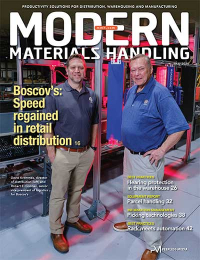Report indicates chances of e-commerce sales being taxed are slipping away
Latest Material Handling News
In mid-2013, the United States Senate, passed a piece of legislation called the Marketplace Fairness Act.
As previously cited in this space, according to www.marketplacefairness.org, this bill grants states the authority to compel online and catalog retailers (“remote sellers”), no matter where they are located, to collect sales tax at the time of a transaction - exactly like local retailers are already required to do, but states are only granted this authority after they have simplified their sales tax laws. The site added that the Marketplace Fairness Act requires that states must simplify their sales tax laws in order to ease those concerns and make multistate sales tax collection easy.
To be sure, this bill, should it eventually be signed into law would be tremendously unpopular with consumers that are making more e-commerce purchases now than ever, and that will only gain traction in the coming weeks, with holiday shopping season technically here. Not only is shopping from home enthusiastically welcomed by consumers at any time of year really, but one could make the case that it being a tax-free experience is equally welcome.
As it turns out, the prospects of online shopping remaining a tax-free experience appear to be pretty strong, based on an article in today’s Wall Street Journal (WSJ).
In short, the report indicated that brick and mortar retailers that were hopeful Congress would pass the Marketplace Fairness Act will not be pleased, as House Speaker John Boehner indicated he would block the measure, with the WSJ explaining that House Republicans “never warmed to the bill, worrying that voters could view it as an indirect tax increase.”
Even though the Senate passed this bill with bipartisan support, and the bill’s supporters, according to the WSJ, viewed the measure as a matter of fairness to storefront retailers that have to collect the tax, the report added that retailers argue that online merchants gain a major competitive advantage through what is basically tax-free e-commerce activity.
But the Senate is not done yet, with the report noting that its Senate sponsors want to mesh it with the popular 15-year moratorium on state taxes on Internet access, referred to as the Internet Tax Freedom act that is set to expire on December 11, and would essentially “force its passage,” the WSJ said.
The thing is, though, even if the bill became law, chances are that its subsequent impact on e-commerce activity would be minimal.
As noted in this space in July 2013, given the increasing emergence of e-commerce from both a consumer ease and increased bottom line for parcel bellwethers UPS and FedEx, it stands to reason that the effects of the bill could be minimal even though we consumers may have to pay a little bit more for that hockey stick or new shirt we order online.
What’s more, parcel bellwethers UPS and FedEx have reaped the benefits of e-commerce in the form of higher volumes and yields.
As a case in point, Rob Martinez, president & CEO of Shipware Systems Corp., previously told LM that UPS and FedEx have obviously benefited from the growth in ecommerce in recent years – and continue to do so. Growth within the Ground Residential networks (including FedEx SmartPost and UPS SurePost) continue to outpace other divisions. With the USPS, parcel services (including Priority Mail, Parcel Select and First Class Parcel) are growing and profitable. I’m surprised these companies are not actively lobbying to squash proposals for online taxes.”
Alternatively, Martinez surmised that UPS and FedEx might have realized online sales taxes will mirror sales taxes as an eventuality in tax-strapped municipalities. And Martinez said he believes that the online sales tax will not have too much of a negative impact on e-commerce’s meteoric growth into the future, due to the fact that consumers shop online for the myriad of benefits afforded including time savings, price/product/company comparisons, lower cost of goods, home delivery convenience, free shipping promotions, and easy return policies.
It also bears repeating that it really is difficult to picture a meaningful decrease in e-commerce activity should the Marketplace Fairness Act ever see the light of day, a prospect that truly seems to be dwindling.
On top of that, e-commerce activity only continues to heat up, with more retailers beefing up their e-commerce efforts, which could, in turn, be viewed as steps mandated to survive and compete.
But at the same time that does not mean by any stretch that retail concerns are backing down.
“The National Retail Federation (NRF) and our members will continue to advocate for online sales tax fairness legislation in the lame duck and into the next Congress if need be,” NRF spokesman Stepen Schatz told LM. “This is and will remain a retail industry and small business priority.”

Article Topics
Blogs News & Resources
Latest in Materials Handling
MHEFI awards record-breaking $231,700 in scholarships to 61 students ALAN opens nominations for 2024 Humanitarian Logistics Awards Kenco to install an AutoStore system at its Jeffersonville, Ind., DC Schneider Electric rolling out WMS and TMS solutions from Manhattan Associates at scale Leaders Q & A with Bryan Ferguson: Resurgence of RFID technology Tom Panzarella appointed Chief Technology Officer at Seegrid Mallard Manufacturing joins the MacLean-Fogg family of companies More Materials HandlingAbout the Author
Subscribe to Materials Handling Magazine

Find out what the world's most innovative companies are doing to improve productivity in their plants and distribution centers.
Start your FREE subscription today.
May 2024 Modern Materials Handling

Latest Resources










